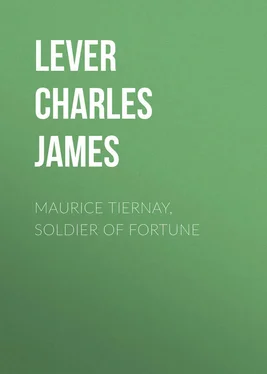Charles Lever - Maurice Tiernay, Soldier of Fortune
Здесь есть возможность читать онлайн «Charles Lever - Maurice Tiernay, Soldier of Fortune» — ознакомительный отрывок электронной книги совершенно бесплатно, а после прочтения отрывка купить полную версию. В некоторых случаях можно слушать аудио, скачать через торрент в формате fb2 и присутствует краткое содержание. Жанр: literature_19, foreign_antique, foreign_prose, на английском языке. Описание произведения, (предисловие) а так же отзывы посетителей доступны на портале библиотеки ЛибКат.
- Название:Maurice Tiernay, Soldier of Fortune
- Автор:
- Жанр:
- Год:неизвестен
- ISBN:нет данных
- Рейтинг книги:3 / 5. Голосов: 1
-
Избранное:Добавить в избранное
- Отзывы:
-
Ваша оценка:
- 60
- 1
- 2
- 3
- 4
- 5
Maurice Tiernay, Soldier of Fortune: краткое содержание, описание и аннотация
Предлагаем к чтению аннотацию, описание, краткое содержание или предисловие (зависит от того, что написал сам автор книги «Maurice Tiernay, Soldier of Fortune»). Если вы не нашли необходимую информацию о книге — напишите в комментариях, мы постараемся отыскать её.
Maurice Tiernay, Soldier of Fortune — читать онлайн ознакомительный отрывок
Ниже представлен текст книги, разбитый по страницам. Система сохранения места последней прочитанной страницы, позволяет с удобством читать онлайн бесплатно книгу «Maurice Tiernay, Soldier of Fortune», без необходимости каждый раз заново искать на чём Вы остановились. Поставьте закладку, и сможете в любой момент перейти на страницу, на которой закончили чтение.
Интервал:
Закладка:
He could speak of no other name – Hoche was the hero of all his thoughts; his gallantry, his daring, his military knowledge, his coolness in danger, his impetuosity in attack, his personal amiability, the mild gentleness of his manner, were themes the young soldier loved to dwell on; and however pressed by me to talk of war and its chances, he inevitably came back to the one loved theme – his general.
When the men were safely housed for the night, I invited my new friend to my own quarters, where, having provided the best entertainment I could afford, we passed more than half the night in chatting. There was nothing above mediocrity in the look or manner of the youth; his descriptions of what he had seen were unmarked by anything glowing or picturesque; his observations did not evince either a quick or a reflective mind, and yet, over this mass of commonplace, enthusiasm for his leader had shed a rich glow, like a gorgeous sunlight on a landscape, that made all beneath it seem brilliant and splendid.
‘And now,’ said he, after an account of the last action he had seen, ‘and now, enough of myself; let’s talk of thee. Where hast thou been?’
‘Here!’ said I, with a sigh, and in a voice that shame had almost made inaudible. ‘Here, here, at Nancy.’
‘Not always here?’
‘Just so. Always here.’
‘And what doing, mon cher ? Thou art not one of the Municipal Guard, surely?’
‘No,’ said I, smiling sadly, ‘I belong to the “École d‘Équitation.’”
‘Ah, that’s it,’ said he, in somewhat of confusion; ‘I always thought they selected old Serjeants en retraite , worn-out veterans, and wounded fellows, for riding-school duty.’
‘Most of ours are such,’ said I, my shame increasing at every word – ‘but somehow they chose me also, and I had no will in the matter – ’
‘No will in the matter, parbleu! and why not? Every man in France has a right to meet the enemy in the field. Thou art a soldier, a hussar of the 9th, a brave and gallant corps, and art to be told that thy comrades have the road to fame and honour open to them, whilst thou art to mope away life like an invalided drummer? It is too gross an indignity, my boy, and must not be borne. Away with you to-morrow at daybreak to the état-major; ask to see the Commandant. You’re in luck, too, for our colonel is with him now, and he is sure to back your request. Say that you served in the school to oblige your superiors, but that you cannot see all chances of distinction lost to you for ever by remaining there. They’ve given you no grade yet, I see,’ continued he, looking at my arm.
‘None; I am still a private.’
‘And I a sous-lieutenant, just because I have been where powder was flashing! You can ride well, of course?’
‘I defy the wildest Limousin to shake me in my saddle.’
‘And, as a swordsman, what are you?’
‘Gros Jean calls me his best pupil.’
‘Ah, true! you have Gros Jean here, the best sabreur in France! And here you are – a horseman, and one of Gros Jean’s élèves – rotting away life in Nancy! Have you any friends in the service?’
‘Not one.’
‘Not one! Nor relations, nor connections?’
‘None. I am Irish by descent. My family are only French by one generation.’
‘Irish! Ah! that’s lucky too,’ said he. ‘Our colonel is an Irishman. His name is Mahon. You’re certain of getting your leave now. I’ll present you to him to-morrow. We are to halt two days here, and before that is over, I hope you’ll have made your last caracole in the riding-school of Nancy.’
‘But remember,’ cried I, ‘that although Irish by family, I have never been there. I know nothing of either the people or the language – and do not present me to the general as his countryman.’
‘I’ll call you by your name, as a soldier of the 9th Hussars, and leave you to make out your claim as countrymen, if you please, together.’
This course was now agreed upon, and after some further talking, my friend, refusing all my offers of a bed, coolly wrapped his cloak about him, and, with his head on the table, fell fast asleep, long before I had ceased thinking over his stories and his adventures in camp and battlefield.
CHAPTER VIII. ‘TRONCHON’
My duties in the riding-school were always over before mid-day, and as noon was the hour appointed by the young lieutenant to present me to his colonel, I was ready by that time, and anxiously awaiting his arrival. I had done my best to smarten up my uniform, and make all my accoutrements bright and glistening. My scabbard was polished like silver, the steel front of my shako shone like a mirror, and the tinsel lace of my jacket had undergone a process of scrubbing and cleaning that threatened its very existence. My smooth chin and beardless upper-lip, however, gave me a degree of distress that all other deficiencies failed to inflict. I can dare to say, that no mediaeval gentleman’s bald spot ever cost him one-half the misery as did my lack of moustache occasion me. ‘A hussar without beard, as well without spurs or sabretache’; a tambour major without his staff, a cavalry charger without a tail, couldn’t be more ridiculous; and there was that old serjeant of the riding-school, ‘Tron-chon,’ with a beard that might have made a mattress! How the goods of this world are unequally distributed! thought I; still why might he not spare me a little – a very little would suffice – just enough to give the ‘air hussar’ to my countenance. He’s an excellent creature, the kindest old fellow in the world. I ‘m certain he ‘d not refuse me. To be sure, the beard is a red one, and pretty much like bell-wire in consistence; no matter, better that than this girlish smooth chin I now wear.
Tronchon was spelling out the Moniteurs account of the Italian campaign as I entered his room, and found it excessively difficult to get back from the Alps and Apennines to the humble request I preferred.
‘Poor fellows!’ muttered he – ‘four battles in seven days, without stores of any kind or rations – almost without bread; and here comest thou, whining because thou hasn’t a beard.’
‘If I were not a hussar – ’
‘Bah!’ said he, interrupting, ‘what of that? Where shouldst thou have had thy baptism of blood, boy? Art a child – nothing more.’
‘I shared my quarters last night with one, not older, Tronchon, and he was an officer, and had seen many a battlefield.’
‘I know that, too,’ said the veteran, with an expression of impatience – ‘and that General Bonaparte will give every boy his epaulettes before an old and tried soldier.’
‘It was not Bonaparte. It was – ’
‘I care not who promoted the lad; the system is just the same with them all. It is no longer, “Where have you served? – what have you seen?” but, “Can you read glibly? – can you write faster than speak? – have you learned to take towns upon paper, and attack a breastwork with a rule and a pair of compasses?” This is what they called “ le génie ” “ le génie ” – ha! ha! ha!’ cried he, laughing heartily; ‘that’s the name old women used to give the devil when I was a boy.’
It was with the greatest difficulty I could get him back from these disagreeable reminiscences to the object of my visit, and, even then, I could hardly persuade him that I was serious in asking the loan of a beard. The prayer of my petition being once understood, he discussed the project gravely enough; but to my surprise he was far more struck by the absurd figure he should cut with his diminished mane, than I with my mock moustache.
‘There’s not a child in Nancy won’t laugh at me – they’ll cry, “There goes old Tronchon – he’s like Kléber’s charger, which the German cut the tail off, to make a shako plume!”’
Читать дальшеИнтервал:
Закладка:
Похожие книги на «Maurice Tiernay, Soldier of Fortune»
Представляем Вашему вниманию похожие книги на «Maurice Tiernay, Soldier of Fortune» списком для выбора. Мы отобрали схожую по названию и смыслу литературу в надежде предоставить читателям больше вариантов отыскать новые, интересные, ещё непрочитанные произведения.
Обсуждение, отзывы о книге «Maurice Tiernay, Soldier of Fortune» и просто собственные мнения читателей. Оставьте ваши комментарии, напишите, что Вы думаете о произведении, его смысле или главных героях. Укажите что конкретно понравилось, а что нет, и почему Вы так считаете.












